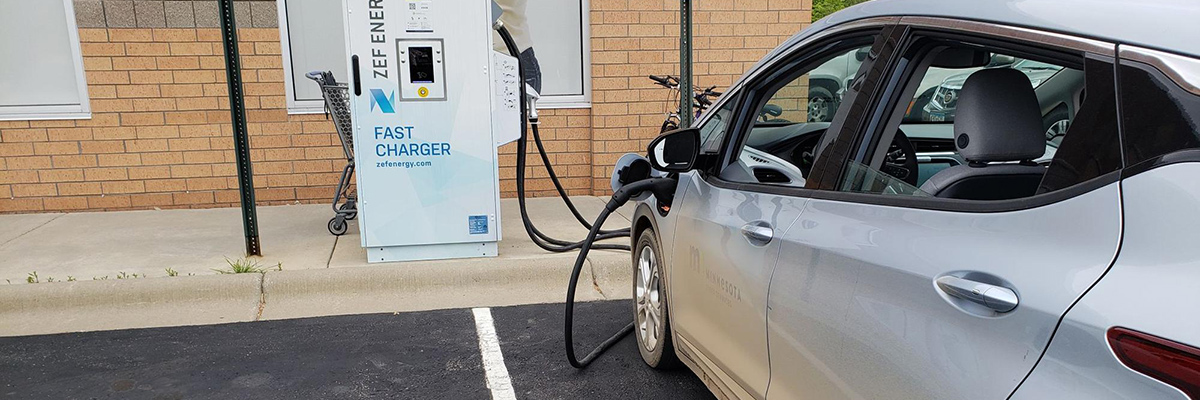
Minnesota electric vehicles
As electric vehicle (EV) [1] sales grow, the Minnesota Public Utilities Commission (Commission) expects to support transportation electrification through affordable, economic electric utility service for plug-in EVs.
The Commission made a series of findings in its Investigation into Electric Vehicle Charging and Infrastructure (Docket No. E999/CI-17-879) and found electrification of Minnesota’s transportation sector is in the public interest. Specifically, the Commission found that transportation electrification can:
-
Promote affordable, economic electric utility service by improving utility system utilization/efficiency and placing downward pressure on utility rates through increased utility revenues and better grid utilization.
-
Grow renewable energy use by increasing electricity demand during hours when renewable energy is most prevalent on the system and developing tariffs that correlate renewable energy resources to EV charging.
-
Reduce statewide greenhouse gas and other harmful emissions.
The Commission has approved several pilots and other programs to advance efficient transportation electrification. These programs include utility owned direct current fast chargers, off-peak charging rate programs, residential charger financing, multi-family dwelling unit pilots to bring charging access to those who do not own their own residence, commercial and business charging rates for large fleets with unique charging needs.
Submitting a comment
If community members are looking to engage in the Commission’s work on these topics, you may submit a comment or directly in an individual docket via eDockets. The transportation electrification planning process where a utility describes their forward-looking electric vehicle plans for the Commission has recently been integrated into the Integrated Distribution Planning documents. The transportation electrification plans were opened to gain a better understanding of the impacts of electric vehicles on the grid system, on utilities, and on customers, as well as how utility regulatory policy can improve upon the transportation charging systems and rates.
Electric Vehicles in Minnesota
As of November 2024, 67,905 electric vehicles were registered in the state of Minnesota
The PUC provides a breakdown of electric vehicle registrations by electric utility service territory, along with more granular data by city, zip code, and vehicle make/model. These data are obtained from the Minnesota Department of Vehicle Services.
| Data set | Date of data pull | Data publish date |
| 2018 EV Registration Data | April 2019 | December 12, 2024 |
| 2019 EV Registration Data | February 2020 | December 12, 2024 |
| 2020 EV Registration Data | February 2021 | December 12, 2024 |
| 2021 EV Registration Data | December 2021 | December 12, 2024 |
| 2022 EV Registration Data | January 2023 | December 12, 2024 |
| 2023 EV Registration Data | January 2024 | December 12, 2024 |
| 2024 EV Registration Data | November 2024 | July 07, 2025 |
Relevant EV dockets
| Docket number | Description | Utility |
| 12-874 | Residential Electric Vehicle Service | Dakota Electric Association |
| 15-111 | Residential Electric Vehicle Charging Tariff | Xcel Energy |
| 15-112 | Off-Peak Electric Vehicle Rider | Otter Tail Power |
| 15-120 | Residential Electric Vehicle Service | Minnesota Power |
| 17-817 | Residential EV Service Pilot | Xcel Energy |
| 17-879 | Inquiry into Electric Vehicle Charging and Infrastructure | All investor-owned utilities |
| 18-643 | EV Infrastructure Pilots | Xcel Energy |
| 19-186 | Residential EV Subscription Pilot | Xcel Energy |
| 19-337 | EV Commercial Charging Pilot | Minnesota Power |
| 19-559 | Home EV Service Offering | Xcel Energy |
| 20-181 | EV Portfolio | Otter Tail Power |
| 20-638 | Residential EV Portfolio | Minnesota Power |
| 20-711 | Multi-Dwelling Unit EV Service Pilot | Xcel Energy |
| 20-745 | COVID Recovery EV Portfolio | Xcel Energy |
| 21-101 | Load Flexibility Portfolio | Xcel Energy |
| 21-127 | Non-Residential and Multi-Family EV Rate Pilots | Dakota Electric Association |
| 21-257 | Electric Vehicle Charging Infrastructure | Minnesota Power |
| 22-592 | Virtual Metered EV Rate Pilot | Dakota Electric Association |
| 23-258 | Residential EV Service Pilot | Minnesota Power |
| 23-380 | Residential Electric Vehicle Service | Otter Tail Power |
| 23-452 | Residential EV Service Pilot | Xcel Energy |
Relevant EV Statutes:
The Legislature has taken steps to facilitate the adoption of EVs in Minnesota.
Minn. Stat. 216B.02, Subd. 4 exempts entities that sell electricity for EV charging from regulation as a public utility, which allows non-utilities to develop and operate charging infrastructure.
Minn. Stat 216B.1614 requires each public utility to have a rate specifically designed for EV charging that offers time-of-day or off-peak rates to customers who own EVs.
Minn. Stat 216B.1615 requires public utilities to file Transportation Electrification Plans with the Commission
[1] Minn. Stat. § 169.011, subd. 26a, defines “electric vehicle” as “a motor vehicle that is able to be powered by an electric motor drawing current from rechargeable storage batteries, fuel cells, or other portable sources of electrical current, and meets or exceeds applicable regulations in Code of Federal Regulations, title 49, part 571, and successor requirements.” The definition includes a neighborhood electric vehicle, a medium-speed electric vehicle, and a plug-in hybrid electric vehicle.

